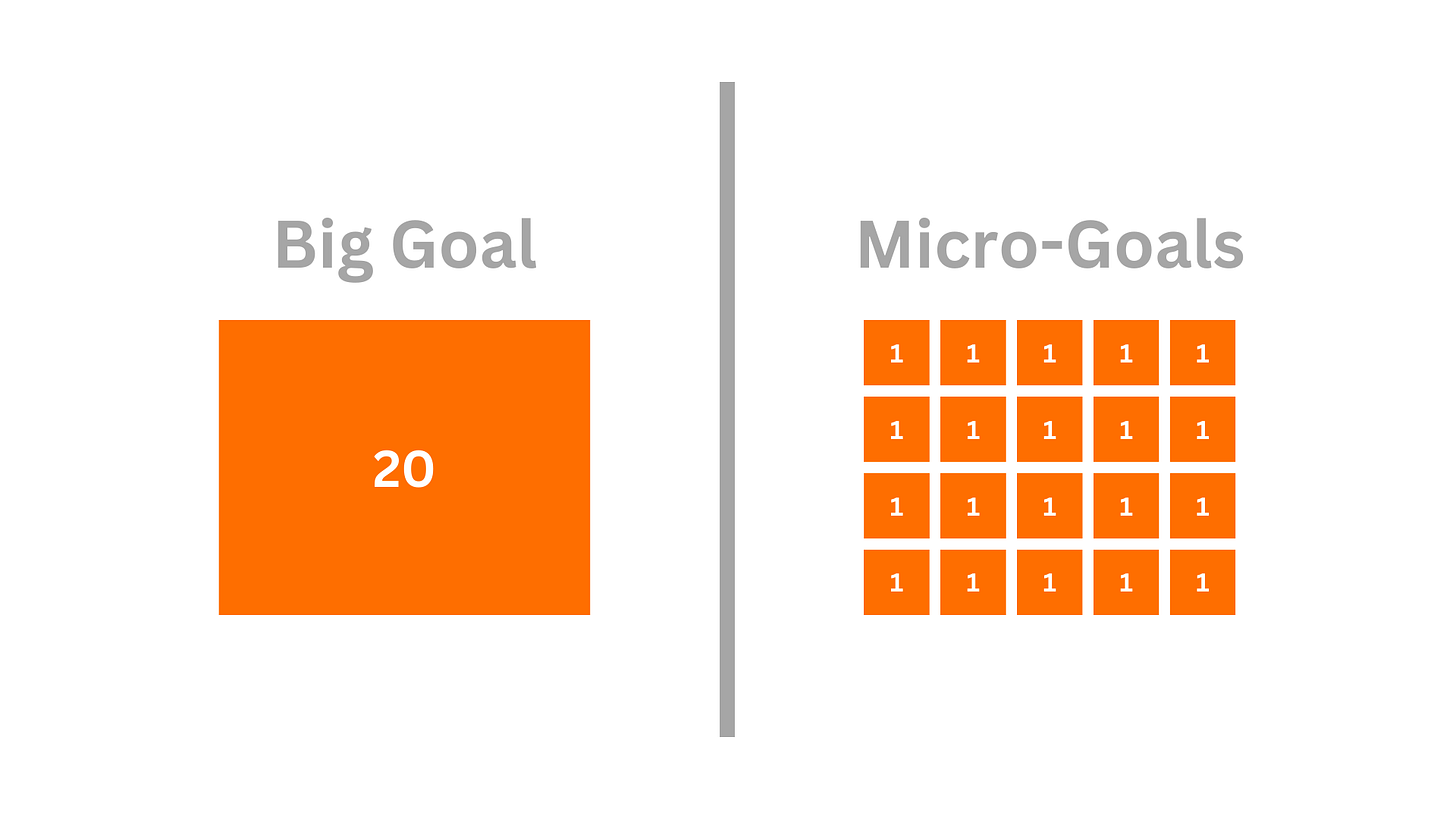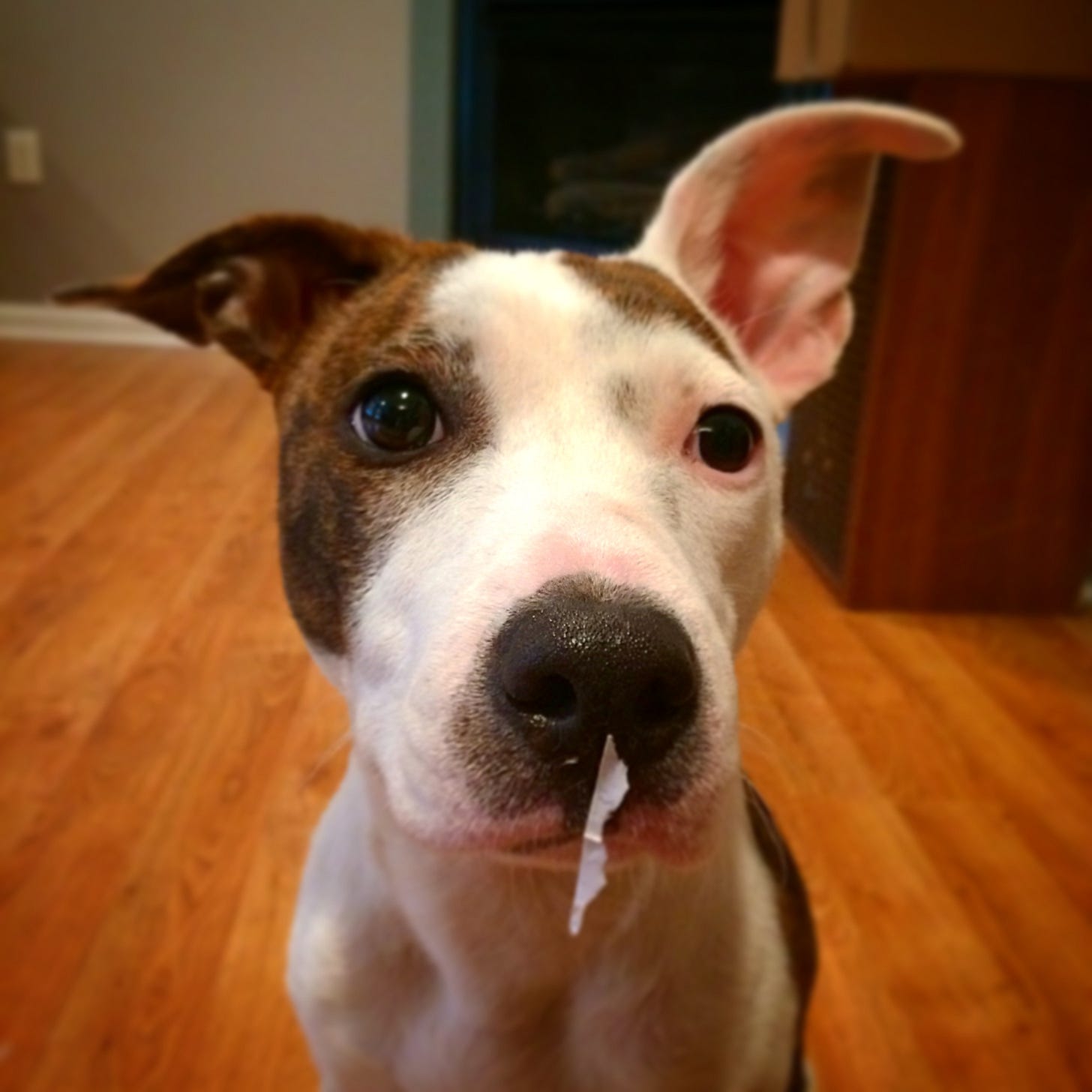If I can put on pants, I can do anything.
How Micro-Goals ended my writing paralysis and made life so much easier.
Welcome to EFFIGIES, a weekly newsletter offering actionable insights from my journey through reading and writing comics, designed to inspire you towards building a better life. To become our best selves, we must burn away who we are today.
What’s Inside:
My struggle with writing paralysis during the pandemic.
A thoughtful interrogation of how we do everything we do in a day.
How Micro-Goals (or in my case, Micro-Scripting) make big tasks manageable.
Back during the early days of the pandemic, I struggled to write new comic scripts. I mean I really struggled.
For most writers, the act of writing is daunting to begin with. It’s always a big, time-consuming project that’s bathed in self-doubt. But historically, I’ve been fairly immune to Writer’s Block, Imposter Syndrome, and other bottlenecks to writing.
Case in point: In 2018, I wrote the first draft of Dead End Kids in just eight days. But in those early days of the pandemic, the idea of producing even 20 pages of script was simply paralyzing.
I didn’t know what to do.
Getting Everything Done.
Then I started thinking about all the things that I need to do on a given morning. Every day, I need to wake up, make the coffee, get cleaned up, get dressed, eat, and take care of my wonderful, wonderful dog Waffle.
This is pretty streamlined, too. There are other things to do each morning and on certain days, other-other things that need to get done. And this is just in, say, the first 90 minutes of the day. The whole day consists of many tasks, each a process unto itself, that contribute to the very complex task of getting through the day. Yet, I do all of these things every day and mostly don’t give it any thought.
In the Effigies Framework issue a couple weeks back, I wrote about the importance of quality questions. Curiosity is one of the keys to a good life, but the real secret lies in thoughtful interrogation. So I asked myself how — by what mechanism — do I make it through every single day with all of these different things to do?
Micro-Goals.
What Are Micro-Goals?
A Micro-Goal is exactly what it sounds like: it’s a small goal. But it’s also part of a set of to-dos that encompass a single, Big Goal. Micro-Goals, conceptually, are new to my life, but I’ve been practicing them intuitively for as long as I remember.
You have been, too.
Think about when you get dressed in the morning. On any given day, you need to put on a shirt, pants, socks, shoes, and at least a couple of other things. Collectively, the act of getting dressed is actually a pretty complex task, but when’s the last time you gave it any real thought? Probably not recently, if ever. That’s because you’ve subconsciously learned to break up that complex task into a handful of subtasks. You put on your pants. Then you put on your socks. Then you put on your shoes. But all those things are part of the singular Big Goal of getting dressed.
So, we inherently understand Micro-Goals on an intuitively level, and they work. But if we begin to consciously apply Micro-Goals, they can be a very powerful framework for making progress and gaining momentum.
Micro-Scripting.
Once I had my Aha! moment about Micro-Goals, I started figuring out the best way to put them into practice to beat my writing paralysis. This brought me to three additional questions:
Question 1: What was my Big Goal?
First, I asked myself what my Big Goal was. Honestly, this was the easiest question because I already knew the answer: I wanted to write a 20-page script.
Question 2: What were the Key Units of the Big Goal?
Next, I spent some time thinking about the various parts of my Big Goal. For a comic script, there are pages, panels, dialogue, sound effects, narration, and so on that need to be written.
But for this question, I needed to find a Key Unit, something, that when completed, a meaningful (but not overwhelming) part of the Big Goal was completed. Putting the focus on something like narration or SFX would be too granular.
No, the Key Units of a comic script are the pages.
Question 3: What was my Plan for completing the Key Units?
Finally, I asked myself how I could reasonably complete the Big Goal by tackling the Key Units? I wanted to focus on what was reasonable because if I were to get overwhelmed, that would defeat the purpose of the Micro-Goals approach.
With scripting, I’m not particularly time-bound, but I wanted to build-in consistency. So I made a reasonable Plan of writing 1 page of script each day for 20 days. Here’s what that looks like visualized:
A lot more manageable, right? By asking myself these questions, I was able to get some perspective on the seemingly daunting task of writing the script. The Big Goal of writing 20 pages became 20 Micro-Goals of writing a single page each day.
And when I put this Plan into action, I actually made better progress than expected. On multiple days, I ended up writing more than one page of script. I finished the draft and I did it in just 14 days (or 33% faster than planned, for any stats nerds).
Framework: Micro-Goals
Obviously, Micro-Goals don’t apply to just writing comic scripts. It’s a framework you could literally apply to any big project.
Here are the steps:
Step 1: Define the Big Goal.
Step 2: Determine the Key Units of the Big Goal.
Step 3: Make a Plan to complete the Key Units.
Step 4: Execute the Plan.
Step 5: Complete the Goal.
Remember, it’s important to keep your Key Units manageable; otherwise, you’ll end up right where you started — overwhelmed. And while not essential, adding a time-bounding aspect to your plan (I will complete 1 page of script each day for 20 days) can be a powerful modifier for building consistency.
You could also stack this with the Effigies Framework and add a small reinforcing ritual that you do when you complete each Micro-Goal.
So, what’s a big project sitting in front of you that can be made more manageable with Micro-Goals?
I know it’s a bit of a jump to say “If you can put pants on, you can do anything,” but it’s true. With some good questions and a solid framework, you really can do just about anything.
- Frank
I’m Frank Gogol, writer of comics such as Dead End Kids, No Heroine, Unborn, Power Rangers, and more. If this newsletter was interesting / helpful / entertaining…
After Credits Scene.
After last week’s heavier-than-usual but important issue of the newsletter, I wanted to even the scales a bit. I mentioned my dog, Waffle, above. Here is a picture of her in all her glory to brighten your day:
She’s an absolutely treasure, isn’t she?









